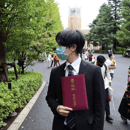According to Friedrich Hayek, trying to completely conquer innocence with rationality and erasing all uncertainties from human life is a new form of immaturity. He argued that the real maturity of human beings is to be able to bravely apply the tools of rationality while confronting and coexisting with the painful reality that we are never able to totally break away from ignorance. Does this mean that rationality is not important? Perhaps It is an important basis for human life, but we need to be extra-cautious about the risks of overstatement and the misuse of it. From my perspective, it is the process of trying to discover the “truth” and making sense of the very “meaning” of one’s existence that could motivate us to reflect upon our past and to gaze out onto our future.
We probably are all like Sisyphus in Greek mythology – always pursuing knowledge but never being able to get even close to the “truth.” However, Sisyphus did not give up. He repeated his journey rolling a boulder up a hill only for it to roll down thousands of times. Were his journeys simply vain and meaningless? I do not think so. I believe that he was fighting his own glorious battle to finally reach the mountain top. He had a sense of mission and a purpose that served his efforts. Although he was seemingly locked in this eternal cycle, he was actually freer from a particular perspective – freer with unwavering passion, and freer with undeniable mental strength. This reflects the idea Immanuel Kant had famously put forth: “Rational human beings should be treated as an end in themselves and not as a means to something else.”
“Two things fill the mind with new and increasing admiration and awe, the more often and steadily we reflect upon them: the starry heavens above me and the moral law within me,” said Immanuel Kant. Our efforts to get closer to the “truth” are not vain. All of us could see the “stars” as long as we always reflect on the purpose of our own existence and insist on our fundamental spiritual order. Especially living in today’s fast-paced, high-tech, and commercial world, we need to know and keep our “reason” for existence and the destination we are planning to head to. In order to do so, let us remember the teachings of those great philosophers and thinkers in Western history. Let us talk with them by reading their monumental works and relating their discussions to our daily lives.
Open a book of the great philosophers if you have not, and I am sure you can get something inspiring out of it. Let us read not only for the sake of instrumental purposes such as exams, but for understanding who we are and why we are here. Let’s not let endless social media posts and TV programs wash away our ability to think for ourselves, and let’s not allow pragmatism and the herd effect to determine our career and social relations.
We should not act like Faust. We should not trade our individuality and autonomy for comfort and certainty – It is a deal with the devil. As long as the questions of dignity, liberty, justice, and love are still relevant to us, the beautiful minds in history will never die. “The unexamined life is not worth living,” said Socrates. Thankfully, we are still young, and there is no hurry for us to truly reconcile between who we are and whom we want to become.


